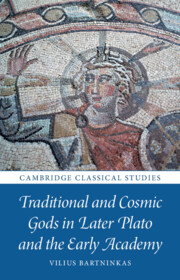Traditional and Cosmic Gods in Later Plato and the Early Academy
This book sheds new light on Plato’s cosmology in relation to Greek religion by examining the contested distinction between the traditional and cosmic gods. A close reading of the later dialogues shows that the two families of gods are routinely deployed to organise and structure Plato’s accounts of the origins of the universe and of humanity and its social institutions, as well as to illuminate the moral and political ideals of philosophical utopias. Vilius Bartninkas argues that the presence of the two kinds of gods creates a dynamic, yet productive, tension in Plato’s thinking which is unmistakable and which is not resolved until the works of his students. Thus the book closes by exploring how the cosmological and religious ideas of Plato’s later dialogues resurfaced in the Early Academy and how the debates initiated there ultimately led to the collapse of this theological distinction.
Vilius Bartninkas is an assistant professor at Vilnius University. He has published various articles on Greek philosophy and political theory, and Lithuanian translations of Plato’s Lysis (2014) and Alcibiades (2016).



